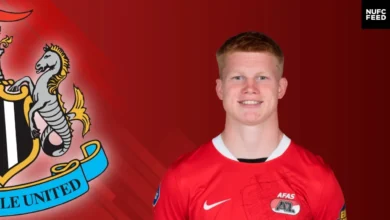“It Concerns Us” – Richard Masters’ Bold Remarks on Newcastle United’s PSR Challenges
Premier League CEO Richard Masters Criticizes Proposed Independent Football Regulator, Warning of Risks to Foreign Investment

The comments come as clubs like Newcastle United and Aston Villa express growing frustration with the Financial Fair Play (FFP) and Profitability and Sustainability Regulations (PSR).
Newcastle’s ambitions, fueled by a Saudi-backed takeover, have been hindered by these rules, preventing the significant spending initially anticipated.
A cautious summer transfer window saw Newcastle approach the £105 million loss limit, further fueling discontent with the regulations.
Prominent media figures like Simon Jordan and Gary Neville have called for reforms to FFP/PSR.
Amid these demands for change, Premier League chief executive Richard Masters, a familiar figure to Newcastle fans due to the Saudi takeover saga, has defended the current framework.
Interestingly, he praised the PSR for fostering ambition, even as it curbs Newcastle’s aspirations for European dominance.
“In the Premier League, we have a financial system developed over time with clear objectives,” Masters told Sky Sports.
“It’s not just about the PSR system but also the distribution of revenue and costs, and the parachute payment system.
These are designed to create a competitive league that supports aspiration.
“If you’re a fan of a newly promoted club, the parachute system ensures investment protection, allowing clubs to rise and compete for European positions and, potentially, for the league itself.
“However, if external parties regulate from the sidelines, scrutinizing clubs’ business plans and limiting their investments, that concerns us. We’ve always supported investment within measured risk.
The Premier League is not a pension fund; it’s a place where capital is at risk, and outcomes are uncertain. A risk-averse regulatory function could stifle clubs’ ability to invest.”
Masters emphasized that Premier League clubs are already subject to significant regulation, expressing opposition to the government’s proposed Football Governance Bill, which would introduce an independent regulator.
This regulator, potentially active by next season, is a key component of the legislative process currently underway in parliament.
“Football is already heavily regulated,” Masters reiterated. “The Premier League regulates its clubs, as does the Football Association to some extent, and UEFA through its financial licensing system.
“The question is whether we need an independent, statutory regulator to oversee issues like ownership, fan engagement, heritage assets, breakaway leagues, and, most critically, financial sustainability and regulation.”
Masters’ remarks highlight the tension between maintaining the Premier League’s competitive edge and adapting to calls for broader regulatory oversight.



